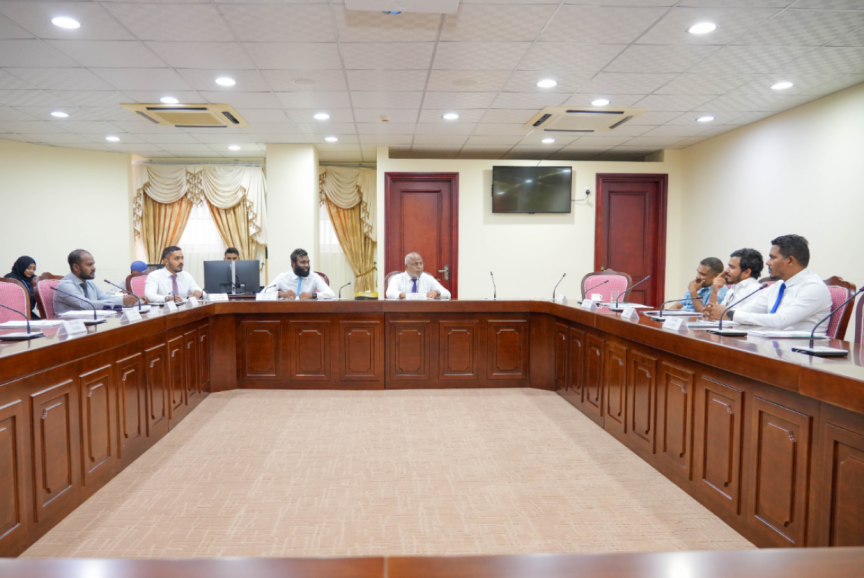
From the parliament's Decentralization Committee meeting that was held on August 5, 2025. (Photo/Parliment)
The Parliament's Decentralization Committee has formally approved the bill to amend the Decentralization Act on Tuesday, without incorporating additional modifications.
This decision was made despite objections from various local councils concerning the implications of these amendments for decentralization.
The government has proposed five amendments to the Decentralization Act. These legislative modifications include provisions that could potentially curtail the authority of councils to recruit employees, lease lagoons and land within their jurisdiction, and implement development projects.
During the Decentralisation Committee meeting on Tuesday evening, amendments were proposed by Henveiru North MP Ahmed Aifan and supported by Vilufushi MP Hassan Waheed.
The committee subsequently passed the bill with a majority vote from PNC members, with the exception of Keyodhoo MP Mohamed Niushad, who represents the opposition Maldives Democratic Party (MDP).
The bill has elicited concern from various individuals, particularly some councils.
Notably, in a departure from standard parliamentary procedure for soliciting public feedback on legislative proposals, the amendment bill to the Decentralization Act was allotted a mere 19 hours for public commentary. The bill was then passed at the committee meeting held on Tuesday evening.

The Maldives Democratic Party (MDP) has consistently opposed the government's amendments to the Decentralization Act. The party characterizes the government's actions as an attempt to undermine the decentralization framework that the MDP established during its tenure in power.
Fayyaz Ismail, Chairman of the MDP, stated that with the proposed amendments, councils would lose their financial independence, leading to the collapse of the decentralization system and forcing councils to become subservient to the central government.
Abdullah Shahid, President of the MDP, asserted that the current government's proposed amendment to the Decentralization Act is intended to re-centralize the financial and natural resources of councils, effectively subjugating the populace.
The proposed bill introduces five key amendments. Local authority companies would be restricted to essential rural infrastructure projects (investments exceeding MVR 10,000,000) and would be required to cease competition with private enterprises within 90 days of the amendment’s enactment. Councils would be prohibited from charging rent for land or buildings utilized for basic public services and would receive revenue after state tax deductions, provided they are not delinquent in public service payments for more than six months. The amendments also mandate that councils maintain bank accounts in accordance with Ministry of Finance procedures and provide statements upon request. In their final year, councils would face restrictions on new employee recruitment, leasing land, lagoons, or reefs, and initiating new development projects not previously specified in council development plans.

In addition, if a council's term is 365 days or less from expiration, certain actions would be restricted without adherence to norms set by the Ministry of Finance and the Local Government Authority (LGA). These include:
Recruitment of contractual or long-term employees for council offices.
Lease and grant of land, lagoons, and reef areas under council jurisdiction.
Initiation of new development projects not specified in council development plans.
In particular, the Ministry of Cities, Local Government and Public Works, which was created by this government as the parent body of the councils, has no power in these amendments either.
The government's amendments follows similar discussions in the past, and the 20th Parliament, which held a supermajority for the current government, previously amended the Decentralization Act multiple times.